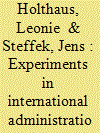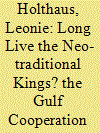|
|
|
Sort Order |
|
|
|
Items / Page
|
|
|
|
|
|
|
| Srl | Item |
| 1 |
ID:
144050


|
|
|
|
|
| Summary/Abstract |
In this article, we reintroduce the political thought of James Arthur Salter (1881–1975), a British diplomat, politician, and university professor, who made a seminal contribution to the emergence of International Relations theory in the interwar years. His academic writings were informed by his professional engagement with the Allied Maritime Transport Council (AMTC) during the First World War and the technical branches of the League of Nations. Salter promoted a distinctly transgovernmental form of expert cooperation in international advisory bodies connected to national ministries. His vision of a depoliticised transnational expertocracy inspired various IR functionalists, not least David Mitrany. Salter suggested such forms of governance also for British national politics, drawing what we call here an ‘international analogy’. His work illustrates very well how the emergence of IR theory was connected to broader trends in political theory, in particular in efforts at adapting democracy to the increasing complexities of industrial modernity.
|
|
|
|
|
|
|
|
|
|
|
|
|
|
|
|
| 2 |
ID:
141054


|
|
|
|
|
| Summary/Abstract |
This article explores L. T. Hobhouse's transformation of liberal internationalism at the beginning of the twentieth century. It argues that Hobhouse's thought contributes to understanding dilemmas within the frame of liberal internationalism and the emergence of international functionalism. Using a philosophical approach, Hobhouse tackled international concerns throughout his life, alongside J. A. Hobson, Gilbert Murray, James Bryce, H. N. Brailsford, Norman Angell, and G. L. Dickinson. He restated a belief in human progress and association in ever-greater circles. But he noted, contra former hopes, that nationalism furthered democracy only briefly, and that liberal democracy remained incapable of bringing about effective international cooperation and moral universalism. In order to resolve this impasse, Hobhouse suggested substituting political with economic democracy on an international scale. The aim was to create an international functional organisation consisting of vocational and civic associations and states, which would allow individuals to entertain multiple, overlapping, and transnational loyalties. He thus anticipated proposals for global reform that became increasingly popular after the end of World War II. However, in spite of his concern with domestic social equality and his borrowing from international socialism, Hobhouse failed to qualify his internationalism with an analogous interest in equality.
|
|
|
|
|
|
|
|
|
|
|
|
|
|
|
|
| 3 |
ID:
169254


|
|
|
|
|
| Summary/Abstract |
This article revisits prevailing ideas about the legitimation of monarchical rule through the Gulf Cooperation Council (GCC) by emphasizing the neo-traditional rule of the GCC regimes. It assumes that legitimacy claims often cross the local, national and (sub-)regional levels and analyzes them from a critical historical perspective and against the background of a global capitalist order. I show that the history of the sub-regional organization is wedded to legitimacy claims, referring to a common Gulf identity and good economic performance for the benefit of the members’ citizens. However, I focus on what often is marginalized in scholarly analyses: The common normalization of highly segregated labor markets on which the neo-traditional regimes depend. In effect, I criticize not only the international failures to oppose the GCC’s common repression of democratic revolt (2011). I also depict a bias in many scholarly analyses of autocratic legitimacy, as they neglect citizen-foreigner gaps. Finally, I argue that geopolitical and elite competition, as evident in the tensions between Saudi Arabia and Qatar, does not prepare the end of the GCC as we know it. Only substantive democratization could do so.
|
|
|
|
|
|
|
|
|
|
|
|
|
|
|
|
|
|
|
|
|